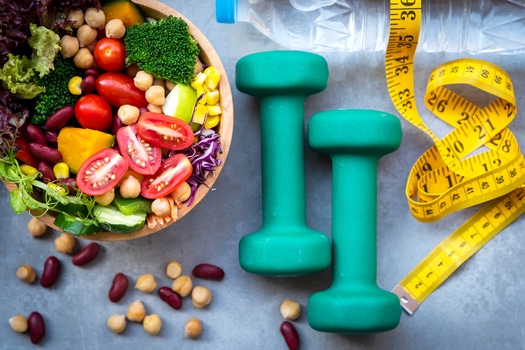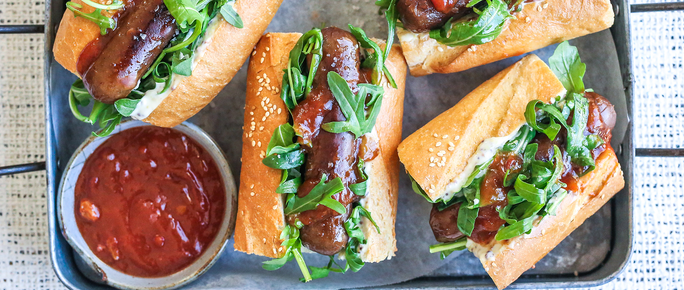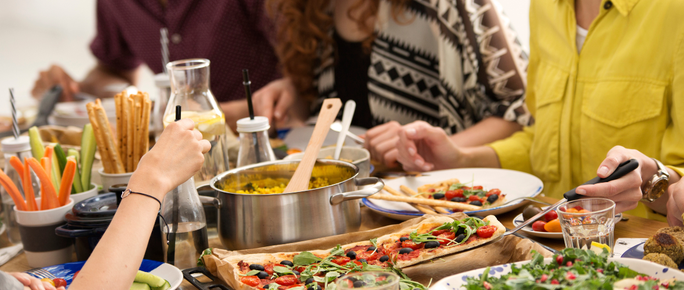
Can Protein Help With Weight Loss?
Protein is an essential nutrient in your diet. It helps you maintain lean muscles, regulate your appetite and keep you full, so you can manage food cravings and stop those 3pm energy crashes.
But just how much protein do you really need each day, especially if you are looking to lose weight?
The National Health and Medical Research Council Nutrient Reference Values (NRVs) recommend women need just 46g of protein a day, more if you are pregnant (60g a day) or over 70 (57g a day). For men it’s 64g a day, increasing to 81g a day when they are over 70.
However, during weight loss, it is often recommended to increase protein intake to preserve as much muscle as possible, or to build muscle at the same time as weight loss (when coupled with a training regime). Protein requirements during different phases of life can be very individual, therefore we’d recommend seeking individualised advice from a Registered Dietitian.
When to eat protein is just as important as how much to eat. Our bodies can’t store protein and excess will generally be converted and stored as fat. The best approach is to spread your protein intake over the day aiming for 25-30g protein per meal. Did you know – most adults consume more than 30g protein at dinner time, and much lower amounts at breakfast and lunch!
Balancing out your protein intake across the day can help you lose weight by keeping your appetite in check, boosting your metabolism and energy intake, and reducing food cravings.
Here are my top 3 tips for nailing a healthy protein balance:
1. Eat More Protein at Breakfast
Adults typically eat the least amount of protein at breakfast, compared to luncha nd dinner. Consuming a high protein breakfast helps with appetite control and feelings of fullness, so try to focus on adding extra protein to start the day. Here are two quick and easy plant powered protein breakfasts that easily tip over 25g of protein, without expensive bars and powders:
Top wholegrain cereal with yoghurt and a sprinkle of nuts and you’ll easily reach more than 25g of protein. Breakdown: 2/3 cup of low fat yoghurt (10g protein), two cereal wheat biscuits (3.8g protein), 1 cup of soy milk (8g protein) and a handful of cashews (5g protein).
Try baked beans and avo on wholegrain toast with a soy latte on the side. Breakdown: 220g can reduced salt baked beans (10.8g protein), two slices wholegrain toast (7.0g protein), 1 cup soy milk (8g protein).
2. Swap to Healthier Protein
Kiwis generally get enough protein, but it’s not always from the right foods. In fact, we get around 40 per cent of our protein from discretionary foods, or foods such as processed meats, fast foods, pastries, biscuits and cakes. It’s not that these foods are always high in protein, it just means people eat a lot of them.
Discretionary foods provide little nutritional value, so while they may contain some protein, they’ll often come with a lot of added sugars, salt and saturated fats.
Also, reducing animal protein intake by replacing with plant proteins is associated with lowering body fat. So, for healthier protein options, opt for plant food sources including legumes, peas, nuts, seeds, soy products such as tofu, soy milk and soy yoghurt, and wholegrains. Also, that way you’re getting your protein with a whole lot of vitamins, minerals and protective plant phytochemicals!
3. Too much of a Good Thing
Too much of any food or food group, even protein, can provide more kilojoules than your body requires and in turn sabotage your weight loss or can even cause weight gain. So don’t overdo it. It is also important to ensure you are eating a healthy and balanced diet, ensuring there is adequate space for a variety of food sources of nutrients and kilojoules.
Do you have a diet question? Or have you seen a nutrition study and wondered about what it means? We’d love to hear from you.
Contact our team of expert dietitians by using the free Ask a Dietitian service - online form here, or you can email or call on 0800 673 392.

The latest nutrition advice, plus health and wellness tips delivered to your inbox monthly

